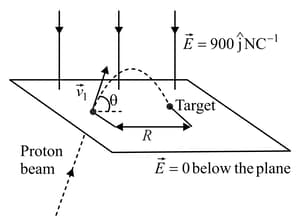B M Sharma Solutions for Chapter: Coulomb's Law and Electric Field, Exercise 5: Concept Application Exercise
B M Sharma Physics Solutions for Exercise - B M Sharma Solutions for Chapter: Coulomb's Law and Electric Field, Exercise 5: Concept Application Exercise
Attempt the free practice questions on Chapter 1: Coulomb's Law and Electric Field, Exercise 5: Concept Application Exercise with hints and solutions to strengthen your understanding. PHYSICS for Joint Entrance Examination JEE (Advanced) Electrostatics and Current Electricity solutions are prepared by Experienced Embibe Experts.
Questions from B M Sharma Solutions for Chapter: Coulomb's Law and Electric Field, Exercise 5: Concept Application Exercise with Hints & Solutions
Is an electric field of the type shown by the electric lines in the figure physically possible?
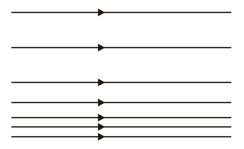
Figure shows three electric field lines.
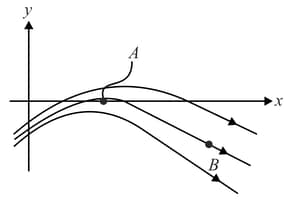
At which point, or , will the acceleration of the test charge be greater if the charge is released?
Figure shows that has the same value for all points in front of an infinitely charged sheet. Is this reasonable? One might think that the field should be stronger near the sheet, because the charges are so much closer
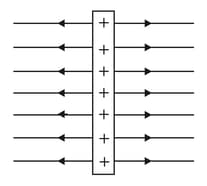
Two points charges and are fixed at a distance of from each other. Sketch the lines of force and locate the neutral point, if any.
Figure shows the tracks of three charged particles in a uniform electrostatic field projected parallel to a plate with the same velocity. Give the signs of the three charges. Which of the three particles has the highest charge to mass ratio?
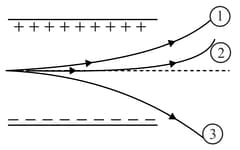
Two charged metal plates in vacuum are apart. A uniform electric field of intensity is applied between the plates. An electron is released between the plates from rest at a point just outside the negative plate.
(a) Calculate how long will the electron take to reach the other plate.
(b) At what velocity will it be going just before it hits the other plate?
An electron moving in a gravitational free space enters a uniform electric field with an initial velocity as shown in the figure.
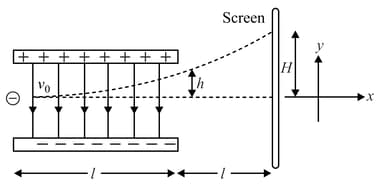
Find the deflection distance undefined in the field.
Find an expression for the velocity of the electron when it just emerges from the field.
Find an expression for the total deflection distance at a vertical screen placed at a distance from the region of the uniform field. (Assume that the field abruptly ends outside the field.)
Protons are projected with an initial speed from a field-free region present above the plane as shown in the figure. The initial velocity vector of the protons makes an angle with the plane. The protons are to hit a target that lies at a horizontal distance of from the point where the protons cross the plane and enter the electric field. Find the angle at which the protons must pass through the plane to strike the target.
